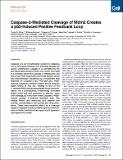Caspase-2-Mediated Cleavage of Mdm2 Creates a p53-Induced Positive Feedback Loop
Author(s)
Oliver, Trudy; Meylan, Etienne; Chang, Gregory P.; Xue, Wen; Burke, James R.; Humpton, Timothy J.; Hubbard, Diana D.; Bhutkar, Arjun (AJ); Jacks, Tyler E.; ... Show more Show less
DownloadOliver-2011-Caspase-2-Mediated C.pdf (1.712Mb)
PUBLISHER_POLICY
Publisher Policy
Article is made available in accordance with the publisher's policy and may be subject to US copyright law. Please refer to the publisher's site for terms of use.
Terms of use
Metadata
Show full item recordAbstract
Caspase-2 is an evolutionarily conserved caspase, yet its biological function and cleavage targets are poorly understood. Caspase-2 is activated by the p53 target gene product PIDD (also known as LRDD) in a complex called the Caspase-2-PIDDosome. We show that PIDD expression promotes growth arrest and chemotherapy resistance by a mechanism that depends on Caspase-2 and wild-type p53. PIDD-induced Caspase-2 directly cleaves the E3 ubiquitin ligase Mdm2 at Asp 367, leading to loss of the C-terminal RING domain responsible for p53 ubiquitination. As a consequence, N-terminally truncated Mdm2 binds p53 and promotes its stability. Upon DNA damage, p53 induction of the Caspase-2-PIDDosome creates a positive feedback loop that inhibits Mdm2 and reinforces p53 stability and activity, contributing to cell survival and drug resistance. These data establish Mdm2 as a cleavage target of Caspase-2 and provide insight into a mechanism of Mdm2 inhibition that impacts p53 dynamics upon genotoxic stress.
Date issued
2011-07Department
Koch Institute for Integrative Cancer Research at MITJournal
Molecular Cell
Publisher
Elsevier
Citation
Oliver, Trudy G., Etienne Meylan, Gregory P. Chang, Wen Xue, James R. Burke, Timothy J. Humpton, Diana Hubbard, Arjun Bhutkar, and Tyler Jacks. “Caspase-2-Mediated Cleavage of Mdm2 Creates a P53-Induced Positive Feedback Loop.” Molecular Cell 43, no. 1 (July 2011): 57–71. © 2011 Elsevier Inc.
Version: Final published version
ISSN
10972765
1097-4164